
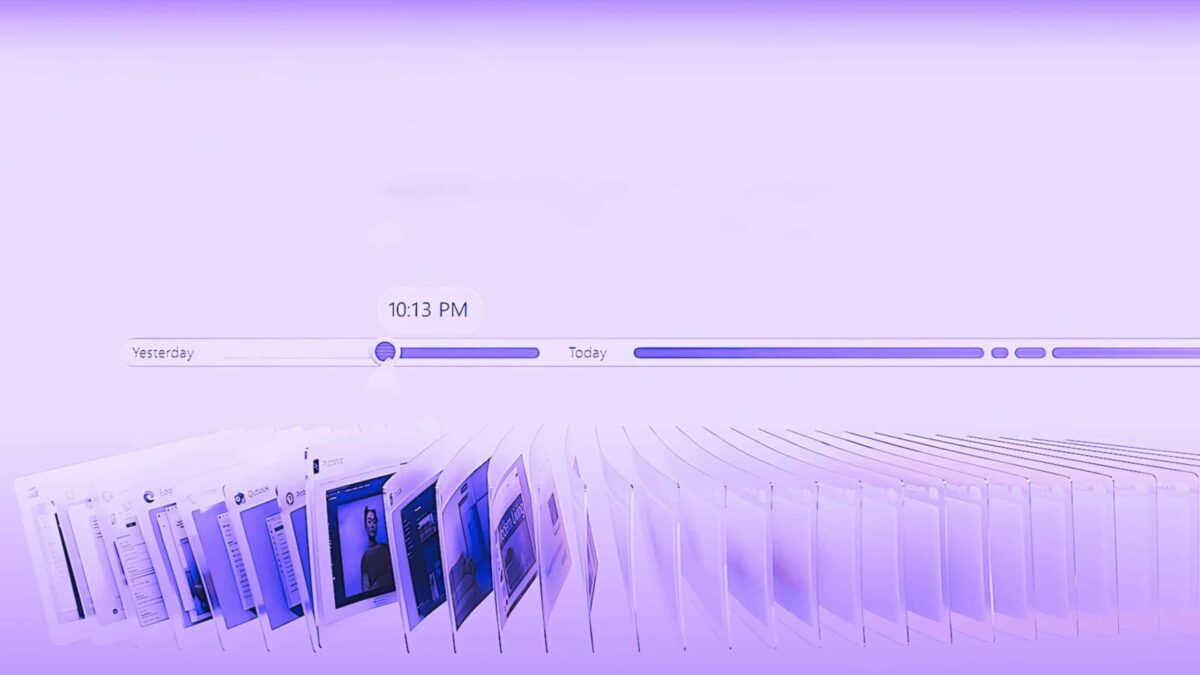
Analysis: The Future of Surveillance? Microsoft Introduces Always-Watching Feature For Every PC
by Christina Maas | May 24, 2024
Welcome to the future, where your computer remembers more about your life than you do. Microsoft’s latest brainchild, the AI-powered Windows 11 Recall feature, announced during a Monday AI event, is a tech marvel designed to “recall” everything you’ve done on your PC for the past three months. Sounds handy, right? Well, only if you’re comfortable with the idea of your computer playing Big Brother.
This brilliant—or terrifying—feature is currently exclusive to Copilot+ PCs with Snapdragon X ARM processors. But don’t worry, Intel and AMD users; Microsoft assures us they’re working diligently to include you in this dystopian dream. Recall works by taking a screenshot of your active window every few seconds, turning your screen into a digital diary of sorts. These snapshots are analyzed by an on-device Neural Processing Unit (NPU) and an AI model to extract data, saving it all in a semantic index. This allows users to browse their history or search for specific moments using human language queries. How cozy.
As it currently stands, the feature will be enabled by default. Microsoft cheerily explains, “The default allocation for Recall on a device with 256 GB will be 25 GB, which can store approximately 3 months of snapshots. You can increase the storage allocation for Recall in your PC Settings. Old snapshots will be deleted once you use your allocated storage, allowing new ones to be stored.”
Security? What Security?
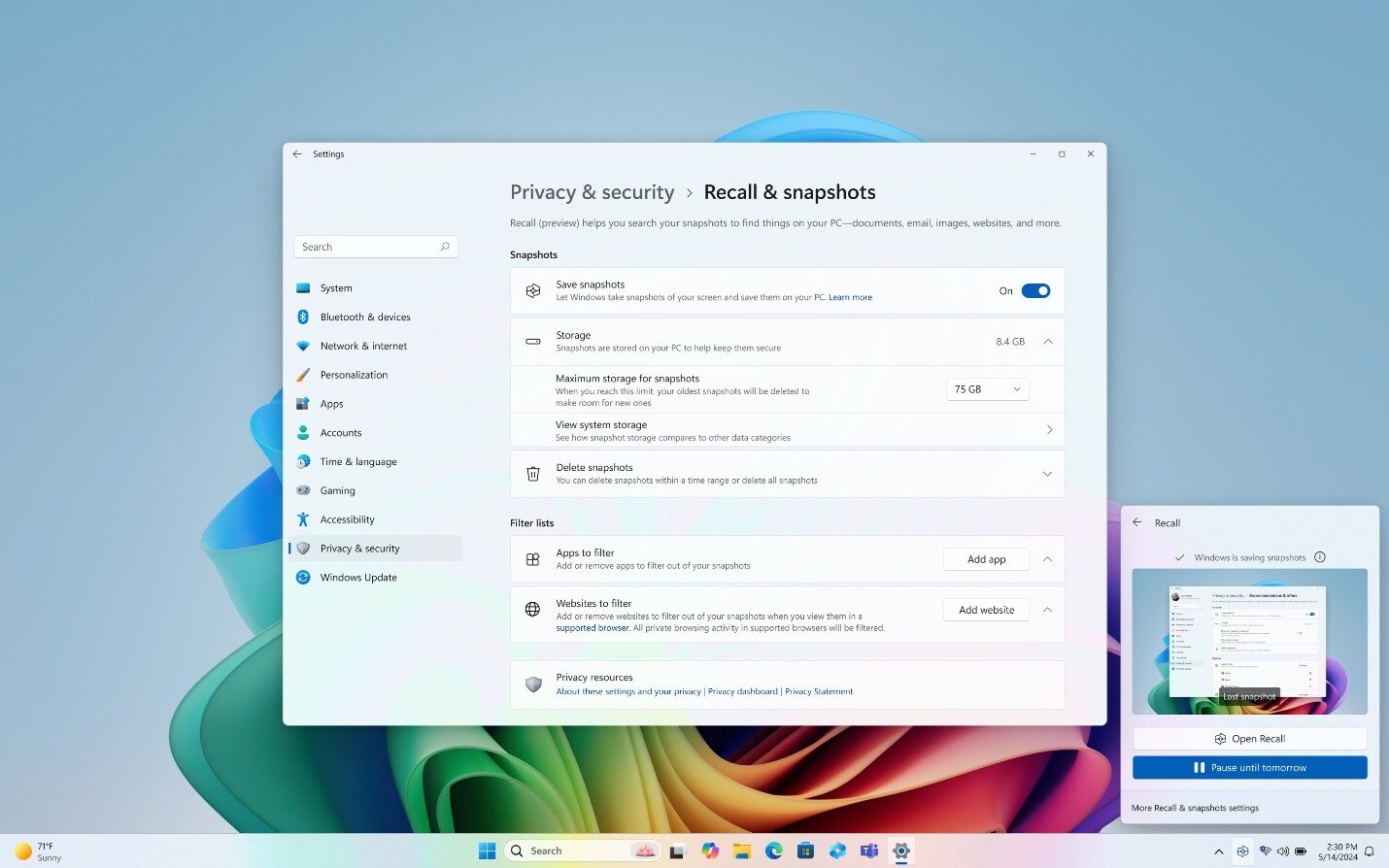
According to Microsoft, “Recall does not take snapshots of certain kinds of content, including InPrivate web browsing sessions in Microsoft Edge. It treats material protected with digital rights management (DRM) similarly; like other Windows apps such as the Snipping Tool, Recall will not store DRM content.”
Oh, that’s comforting. So it won’t take screenshots of your Netflix sessions. But what about everything else? Your passwords, private emails, banking information – all up for grabs. And if you’re not using Microsoft Edge, good luck. Sure, Microsoft promises that all this data is encrypted using BitLocker and stored only on the user’s device. They even throw in a few reassurances about user control, stating that the data is not shared with other users on the same device, and screenshots of InPrivate windows in Microsoft Edge won’t be captured. Yet, oddly, they’ve remained mum on whether something like Firefox or Brave’s private tabs modes gets the same courtesy. What’s the point of using privacy-driven tech if the operating system itself is keeping a record of everything you do?
In a press event, Yusuf Mehdi, Corporate Vice President & Consumer Chief Marketing Officer, emphasized their conservative approach. “We won’t use any of that information to train any AI model, and we put you completely in control with the ability to edit and delete anything that is captured,” Mehdi claimed.
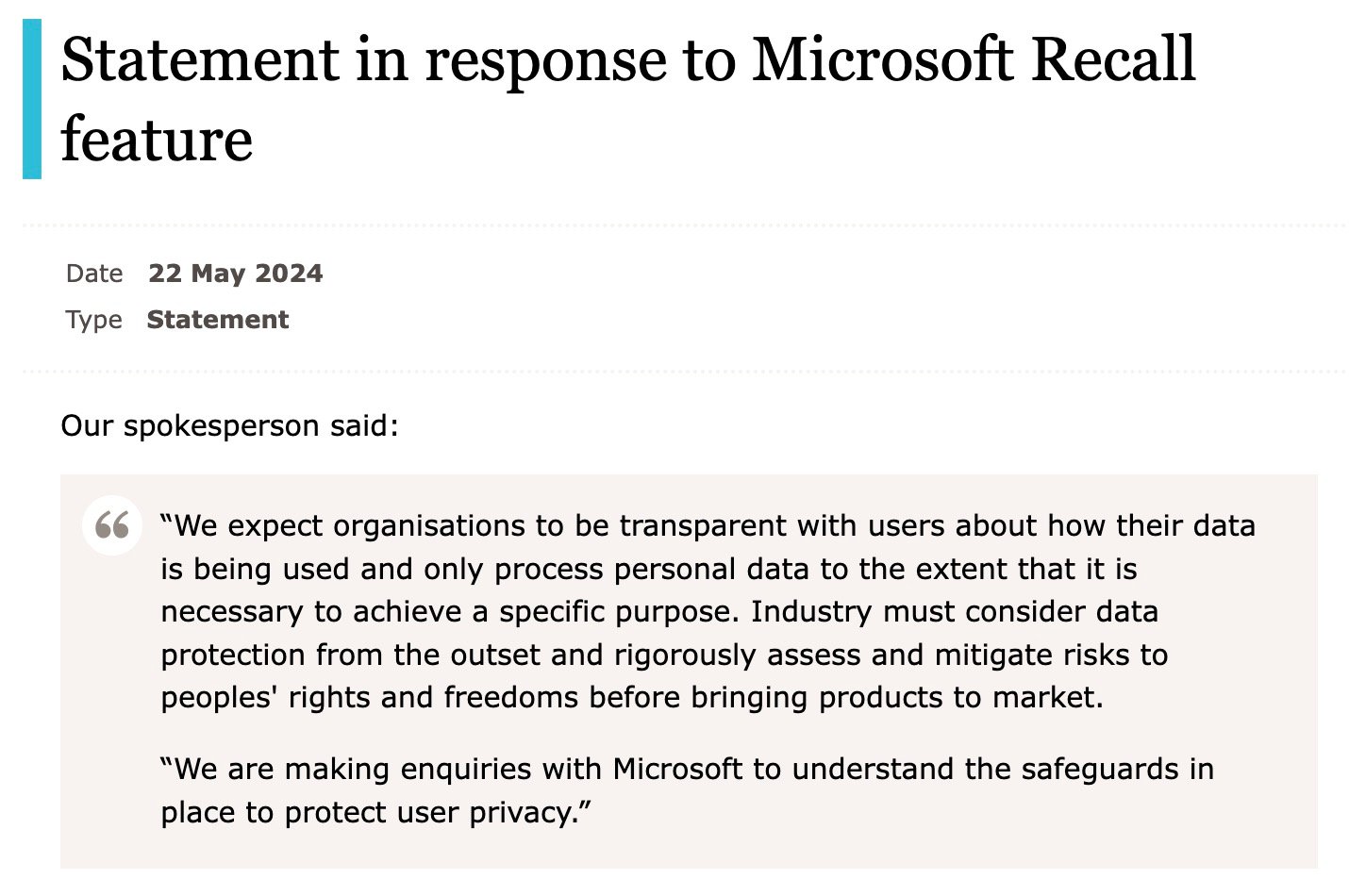
But let’s take a step back and breathe in the pungent scent of skepticism. Large tech companies have a notorious history of exploiting user data, and Microsoft isn’t exactly the poster child of restraint. The UK’s Information Commissioner’s Office (ICO) has already stepped in, seeking assurances that user data will be protected.
The Chilling Implications
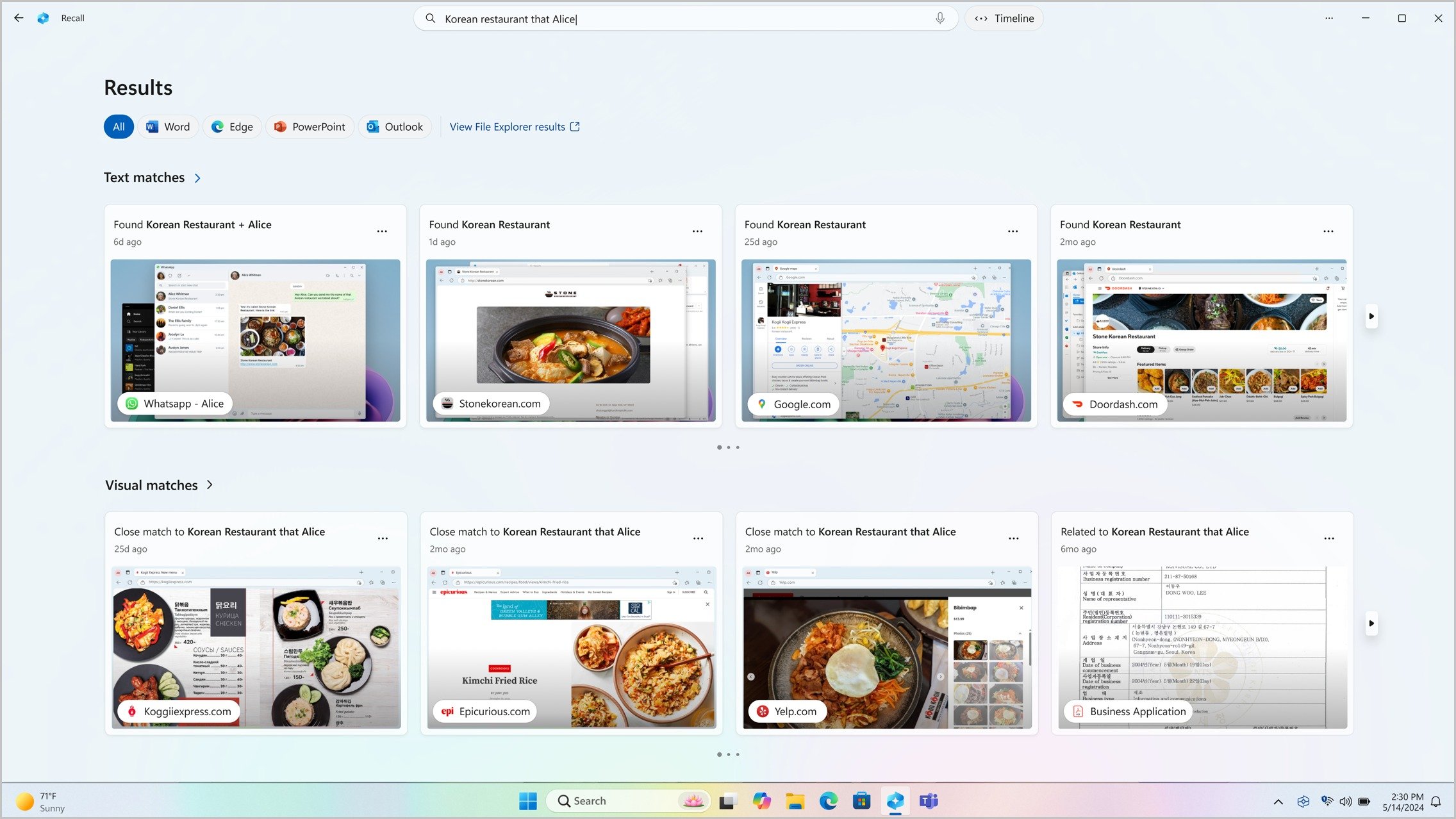
Even if we swallow the corporate Kool-Aid and believe that Microsoft won’t touch our data, the security and privacy implications are still massive. Recall doesn’t discriminate in its screenshot spree, capturing everything from confidential documents to your latest Amazon purchases. Forget to turn off the feature? Your partner or roommate could stumble upon your private moments with a quick search query.
Then there’s the colossal, gaping hole this creates for cyber threats. Once your device is compromised, all that meticulously cataloged data is up for grabs. Cybersecurity expert Kevin Beaumont, often a critic of Microsoft, likened the feature to a “keylogger baked into Windows,” pointing out that malware could easily steal the Recall database and use it for nefarious purposes. He’s not wrong. Imagine a threat actor or malware gaining access to this treasure trove—credentials, sensitive documents, private communications, all laid bare.
Microsoft’s Priorities Questioned
Microsoft’s historical stance has always been to shift blame onto the user once a device is compromised. This new feature seems to take that philosophy to a new level, creating additional risk in an already perilous digital environment. Satya Nadella, Microsoft’s CEO, recently emphasized in an email to employees the importance of prioritizing security over other concerns. “If you’re faced with the tradeoff between security and another priority, your answer is clear: Do security,” Nadella stated.
And yet, here we are, with Microsoft cheerfully rolling out a feature that could become a goldmine for hackers. If this is their idea of prioritizing security, one shudders to think what less secure innovations might look like.
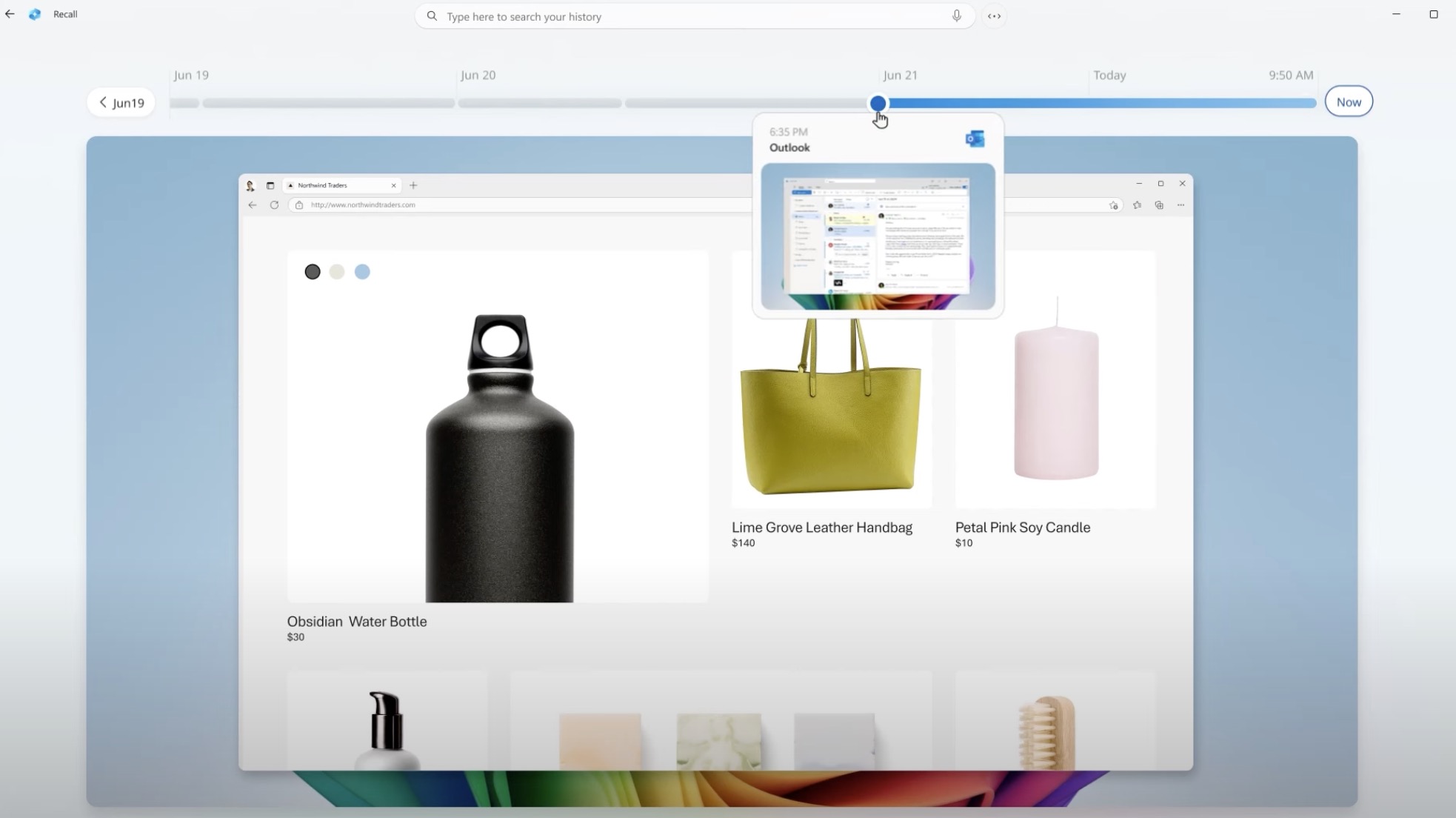
Recall’s ability to log every user action by taking screenshots every few seconds and storing them for up to three months signals a profound shift in how tech companies view and treat our private information. This isn’t just a feature; it’s an open invitation to a surveillance state where every keystroke, click, and glance is recorded and potentially exposed. That’s because it’s a technology that not only chronicles our digital activities but also normalizes the concept that every moment we spend on our devices is ripe for recording and analysis.
Beyond the immediate security risks, Recall undermines trust in technology itself. Users expect their devices to be tools that empower them, not potential spies that monitor every move. This feature challenges that trust, making it harder for consumers to believe that tech companies have their best interests at heart.
The rise of end-to-end encryption, VPNs, and private browsing modes all stemmed from a growing public demand for control over personal information. But Microsoft’s Recall undermines these advancements, turning the clock back to an era of unbridled data collection. Even with promises of encryption and local storage, the very act of capturing and indexing this data introduces risks that are difficult, if not impossible, to mitigate entirely.
Cybercriminals could exploit this treasure trove of information to steal identities, commit fraud, or conduct corporate espionage. Governments could use it to monitor citizens.
Recall’s most insidious aspect is the precedent it sets. If Microsoft can normalize such pervasive data collection under the guise of utility, what’s to stop other tech giants from following suit? We’re already witnessing a steady creep of invasive features across the tech landscape—think of smart home devices that listen in on conversations or social media platforms that track every interaction to serve targeted ads. Recall amplifies these concerns exponentially.
Imagine a future where every device, from your smartphone to your smart fridge, includes similar “features.” The implications are staggering. Not only does this erode the sanctity of private life, but it also sets a legal and cultural precedent that privacy is secondary to convenience. The notion of personal space, even in the digital world, becomes a relic of the past.
Subscribe to Reclaim the Net
Contact Us
Privacy Policy
Sitemap
© 2025 FM Media Enterprises, Ltd.





0 Comments